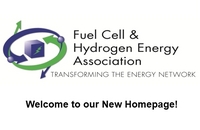Fuel Cell and Hydrogen Energy Association Launches Campaign to Transform the Energy Network
WASHINGTON, DC--Feb. 11, 2011 - The Fuel Cell and Hydrogen Energy Association (FCHEA) launched a campaign today, calling on Congress to continue funding fuel cell and hydrogen programs, which are critical to preserving U.S. leadership in the evolving clean energy network.
"Fuel cells and hydrogen technologies are transforming the energy network through distributed generation of clean, efficient and reliable power using a broad range of domestic fuels," said Ruth Cox, president and executive director of the FCHEA. "Today, the U.S. is the leader in fuel cell and hydrogen technologies, but we are at grave risk of losing our lead to competition in Europe and Asia.
"Congress must act to speed the commercial deployment of these technologies here in the U.S., but also to continue R&D in solid oxide fuel cells, renewable/waste hydrogen generation, advanced hydrogen storage technologies and programs to reduce costs through advanced manufacturing processes in order to sustain our leadership."
To support this campaign, the FCHEA launched its new website today, which can be found at http://www.fchea.org. Through the site, FCHEA will engage an army of grass roots proponents of fuel cells and hydrogen energy, enabling their voices to be heard by lawmakers in an effort to continue funding for these critical programs.
The FCHEA is calling on the Government to acknowledge, in their rhetoric, in their policies and in their government purchases, what energy experts and leaders across the globe have already acknowledged: all clean energy options, including fuel cells and hydrogen, are necessary to reach our economic growth, environmental and energy security goals.
Fuel cells and hydrogen energy are proven to play a unique and vital role in enhancing the performance of renewable and nuclear power, boosting the efficiency and lowering the emissions of fossil fuels, and generating power closer to the point of consumption, relieving grid congestion and reducing the need for high voltage transmission lines.
Leading corporations like Coca-Cola, Google, FedEx and Walmart are using fuel cells and hydrogen to meet mission critical power needs for 7/24 materials handling, grocery store refrigeration and data center operations. The U.S. military is relying on fuel cells and hydrogen energy for light, long duration soldier power and to power unmanned vehicles, increasing their efficiency and effectiveness on the battlefield, as well as for materials handling and stationary applications in non-tactical base operations.
Federal and state governments have partnered with private industry and invested billions of dollars to position America as the leading supplier and consumer of fuel cell and hydrogen energy technologies. R&D funding, tax credits and other progressive policies have already created thousands of jobs.
"Our Industry needs continued Government support to cross the chasm and achieve broad-scale commercial deployment, or we will suffer the fate of other clean energy technologies that are now being manufactured abroad and imported for use in our energy network," continued Cox. "We can't afford to risk throwing away the considerable efforts that have brought us to this tipping point and lose another homegrown industry to foreign competition."



